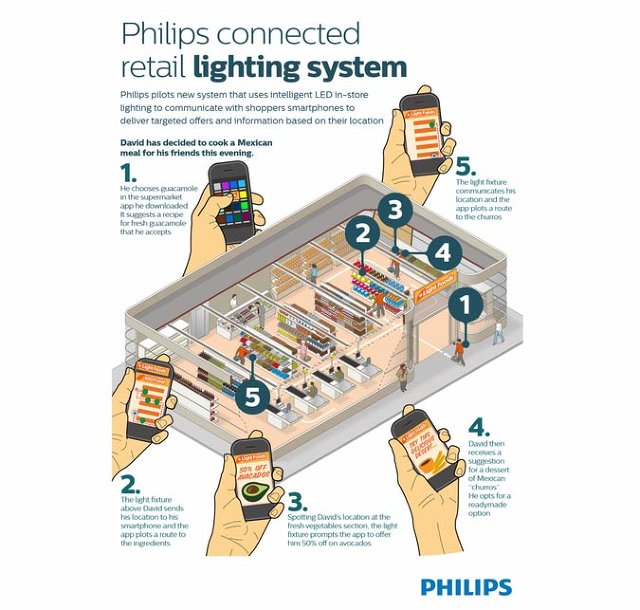Great, Now Even Light Bulbs Are Spying On You
PHILIPS'S NEW LIGHTING SYSTEM CAN TALK (AND BEAM ADS) TO YOU AT THE GROCERY STORE.
Here is Philips's vision for the future of the grocery store. You enter the store. You take out your phone, and open up the Philips app. You're presented with a map of the store, along with your precise location in it. Maybe you type in that you want to cook a specific dish that night, and the Philips app gives you specific directions around the store to get the ingredients you need. As you're doing that, ads from the grocery store will appear on your phone–buy one get one free of this, half off that.
Philips is demonstrating this very setup in a retailer in Dusseldorf, right now.
The most intriguing thing about this is that it all comes from light: the entire setup is built into the overhead lights in the store. Philips, one of the biggest names in lighting (and especially in the new world of low-cost LED lighting), has figured out a way to use light as a communications method.

Basically: light has a whole bunch of different wavelengths, only some of which can be seen by human eyes. So these lights beam out just a tiny bit of data in a wavelength that we can't see–but that your smartphone camera can. That little bit of data is then read by your phone in the same way as a QR code–a QR code gives your phone a URL, which your phone then translates to a video or whatever. Philips's system works the same way.
Menno Kleingeld, general manager for Philips's indoor lighting business, told me that the system won't require you to point your phone at the lights; your phone picks up the special light frequency from ambient light. "You see more and more people with smartphones in their hands when shopping, anyway," he says.
There are two primary concerns with an app like this. The first is that it's creepy–an invasion of privacy that gives businesses and corporations an avenue to slurp a consumer's data and hurl advertising their way. That said, "It's totally opt-out," Kleingeld says, meaning that you have to actually download this app to connect to the system at all. Don't want your grocery store to know your location and shopping history? Just don't download the app. (This, of course, assumes that people fully understand what they're getting into when they download apps.)
The other concern: Will people even bother to download an app? What's in it for them? You could be in a hurry, need to finish your shopping list and need the most efficient way through a store," Kleingeld says, "or it could be triggered when you pass a certain item on a shelf" and are alerted to its existence, usefulness in whatever you're cooking, or some deal. "It could also be coupled to loyalty cards," he says.
For Philips, it's a futuristic way to pitch an expensive, futuristic lighting system (Philips hasn't released pricing yet, but it won't be cheap) to retailers who might otherwise opt for an $8 fluorescent bulb from Home Depot. And a way to compete with Apple, which has a similar system called iBeaconthat's already been rolled out in chains like Macy's (iBeacon differs in that it uses Bluetooth rather than this cool light-data setup).
-
Commercial Lighting Tampa FL, 813-935-4448 / 813-514-1264 / 813-514-1265 / 813-932-1086 / 813-932-1547 / 813-935-8235
CommercialLightingTampa.com, 8139354448 / 8135141264 / 8135141265 / 8139321086 / 8139321547 / 8139358235
Call Us Today!
813-514-1266
813-935-4448
8135141266
8139354448
